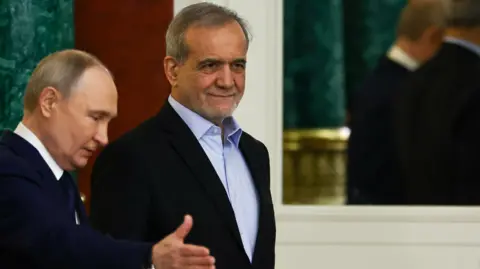Russia and Iran move to strengthen military ties
 Reuters
ReutersRussia and Iran have agreed to closer military co-operation, in a move announced during a visit to Moscow by President Masoud Pezeshkian.
The two countries signed a 20-year "strategic partnership" treaty, covering areas ranging from defence and technology to energy and trade.
Iran already supplies drones to Russia, as well as, according to Western intelligence, ballistic missiles.
Russia has cultivated closer ties with Iran, along with China and North Korea, since its full-scale invasion of Ukraine began in February 2022.
In the treaty, Russia and Iran pledged to consult and co-operate to deal with military and security threats, as well as taking part in joint military exercises on both their territories and beyond.
They also agreed not to allow their territories to be used for actions that threatened the other side.
Iran's President Pezeshkian said the signing of the accord meant that Russia and Iran were entering a new chapter of relations.
Trade between the two countries could be significantly enhanced by more co-operation in the energy sector.
During a joint news conference with his Iranian counterpart, Russian President Vladimir Putin said his country was considering building new nuclear power units in Iran.
Moscow is also seeking to sell some of its surplus gas to Tehran. Since the start of the war in Ukraine, the EU has significantly reduced imports of gas from Russia, spurring Moscow to sign up new customers.
A planned gas pipeline from Russia to Iran, which the countries are negotiating, will be laid through the territory of Azerbaijan if realised, Interfax news agency reported on Friday, quoting Russian Energy Minister Sergei Tsivilev.
Russia could eventually supply up to 55 billion cubic metres of gas per year to Iran, said Putin.
